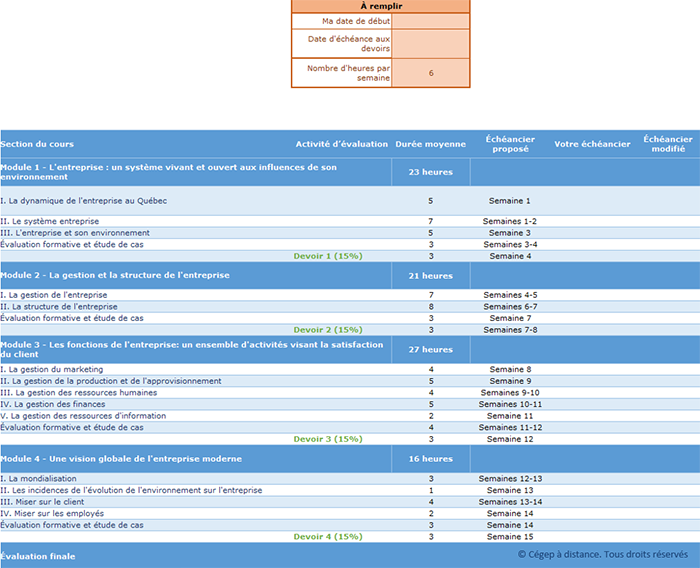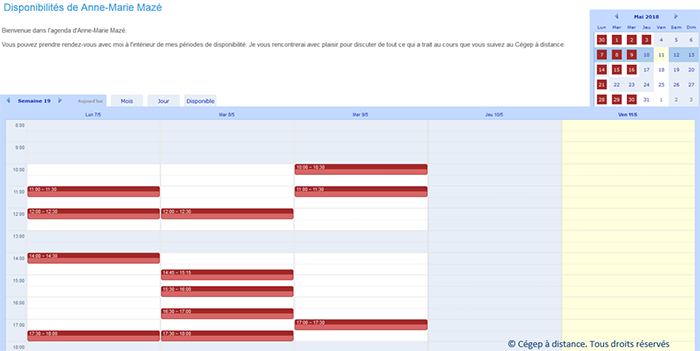Technological Tools in Service of Tutors at Cégep à distance — Supporting and Supervising Students for Success
Whether it be for in-person training or for distance education, when students drop courses or fail, it’s not good for anyone. To reduce the frequency of their occurence, Cégep à distance is leading a pilot project that is wagering on the use of different technological tools. Prior to the summer break in 2018, I interviewed Anne-Marie Mazé, one of 3 professional tutors who works at Cégep à distance. Anne-Marie is a tutor for management and psychology courses… and she is clearly passionate about her work!
A tutor to support and motivate students in a distance education course
Anne-Marie Mazé was an independent part-time tutor at Cégep à distance for 10 ans. She loved her work, and when she learned in 2017 that there were full-time staff positions for tutors at Cégep à distance that were being created for a pilot project, she jumped on the opportunity and submitted her candidature.

Anne-Marie Mazé, via her webcam
Cégep à distance tutors do not usually create the course material and don’t teach to cohorts of students, but the tutors are responsible for the accompaniment, support and supervision of students. They answer student questions and mark their assignments and exams.
Unlike their independent tutor colleagues, the professional tutors:
- are available 35 hours per week to answer student questions, with or without an appointment; by e-mail, by phone or through on-line meetings (on Zoom). Meetings are scheduled with the SuperSaaS platform.
- offer audio or video feedback to students (in addition to written feedback). This is in line with the Devoir+ research project findings from Stéphanie Facchin, who was featured in an article on Profweb (in French). The feedback provided by tutors on the last assignment includes a customized section to help each student prepare for the upcoming exam.
- offer an on-line orientation session to their students. These sessions were the subject of an article in Profweb.
- have tools to help ensure follow-up with students. Tutors contact the students who do not submit their first assignment within the month that follows their registration date, as well as those students who do not submit their final assignment one month before the course deadline date.

A view from of one of the tools that Cégep à distance offers to students: a dynamic scheduling tool. The student enters the number of hours that they are ready to commit to the course each week. The tool creates a study schedule for the student, suggesting submission dates for each assignment. Students at Cégep à distance have 6 months to complete each course.
Increased availability
According to Anne-Marie Mazé, the fact that she is available full-time every week makes a huge difference to students. Knowing that they can immediately call to speak to someone (without leaving a message and waiting for a call) is an important element that contributes to reducing student stress.

A glimpse at Anne-Marie Mazé’s appointments in SuperSaaS showing what students would see. They can use the tool to make an appointment with her, but it is also possible to contact Anne-Marie without an appointment.
During the on-line orientation sessions, Anne-Marie insists that the students should not be shy to get in touch when they need as a means of encouraging them. She reassures them that she is there because she wants to be there, that she chose to be there and that it is a pleasure for her to answer their questions.
I have students that aren’t really “cut out” for distance education, but life circumstances have brought them here… For them, knowing that “I’m there for them,” that there is a real person available to help explain the course matter… it changes things.
Technology to bring students and tutors together
Anne-Marie Mazé has always believed in student success for all students as much as when she was an independent tutor in the past as she does today. The difference is that now, thanks to on-line meetings, the students know it and feel it.
I have students that have written me really touching e-mails “Mrs. Mazé, I never thought that I would be able to pass this course, but you always believed in me…”
Thanks to the on-line meetings, students develop a human relationship with their tutor. They learn to get to know each other. Anne-Marie explained to me that students were more likely to confide in her during the course, now that they meet her on-line as part of the welcome session.
With the on-line meetings, students see us: We’re no longer just a name on a page.
And we see them too! They’re no longer just names on a page… The human relationship is much stronger.
To quickly build a human connection, Anne-Marie invites the students to be informal and use her surname. This helps her to diminish the distance between the students and her.
Some students only contact Anne-Marie by e-mail. Others only phone her and some only use on-line meetings. Some use more than one means of communication. Anne-Marie explains that if each student can choose the means of communication that best suits them, the barriers break down…
For example, Anne-Marie had a student that understood the material well, but still needed to receive some explanations in on-line meetings – to have some human contact in order to be reassured. Having spoken myself to Anne-Marie on the telephone, I can attest to her profound humanity, which came across quite strongly in our conversation. Feeling the passion, the enthusiasm and the warmth of a person must certainly present some added value for the student who would otherwise feel isolated during his or her distance education.
Impact of the project
The success rate and perseverance of students that were enrolled in the course that is supervised by a professional tutor will be analyzed and compared to historical numbers. It is too soon to do this, given that many of the target students have not yet written their final exam and finished their course. But Anne-Marie Mazé tells me that the student feedback is already showing her that there has been a positive impact on their appreciation of the distance education experience. Even if this is the only impact of the project, it is already enormous!

